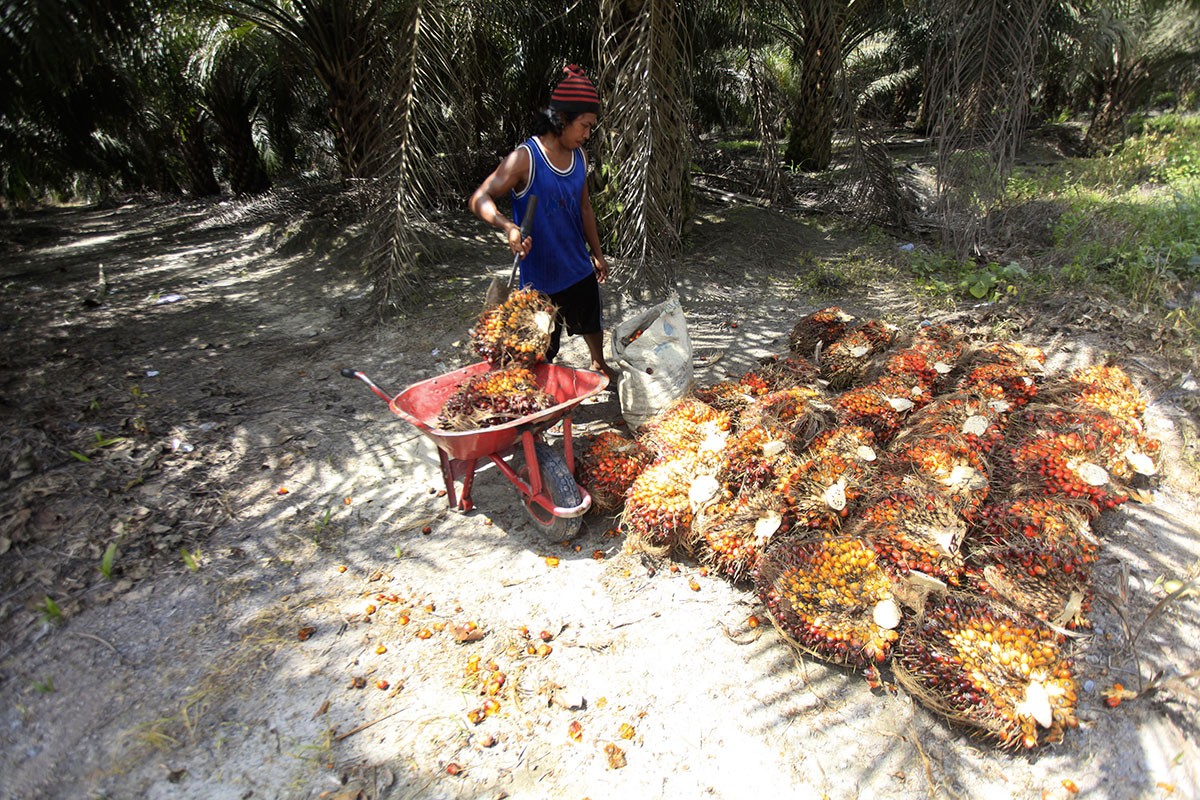Popular Reads
Top Results
Can't find what you're looking for?
View all search resultsPopular Reads
Top Results
Can't find what you're looking for?
View all search resultsPalm oil producer Dharma Satya capex falls short due to project delays
Publicly listed palm oil producer PT Dharma Satya Nusantara (DSN) expects its capital expenditure (capex) this year to fall short of the target by 27 percent at Rp 800 billion (US$53.6 million) due to COVID-19-induced project delays.
Change text size
Gift Premium Articles
to Anyone
 A worker collects oil palm bunches at a plantation in Pangkalan Bun, Central Kalimantan, in December 2015. Publicly listed palm oil producer PT Dharma Satya Nusantara (DSN) expects its capital expenditure (capex) this year to fall short of the target because of COVID-19-induced project delays. (JP/Dhoni Setiawan)
A worker collects oil palm bunches at a plantation in Pangkalan Bun, Central Kalimantan, in December 2015. Publicly listed palm oil producer PT Dharma Satya Nusantara (DSN) expects its capital expenditure (capex) this year to fall short of the target because of COVID-19-induced project delays. (JP/Dhoni Setiawan)
Publicly listed palm oil producer PT Dharma Satya Nusantara (DSN) expects its capital expenditure (capex) this year to fall short of the target by 27 percent at Rp 800 billion (US$53.6 million) due to COVID-19-induced project delays.
The company explained that partial lockdowns had delayed labor and supply inflows to two crude palm oil (CPO) processing factories being built in Kalimantan. DSN currently has 10 such factories in operation.
The new factories, work on which began in 2019 and cost roughly Rp 250 billion each, were slated for completion in 2021, DSN president director Andrianto Oetomo said on Thursday.
“We were hit hard by COVID-19, particularly between March and July,” he said at the virtual inauguration ceremony for a new biogas plant.
Part of this year’s capital also went to finishing the Rp 90 billion palm oil-based biogas plant in Muara Wahau, East Kalimantan. The plant, which took two years to build, fuels a 1.2-megawatt power plant and provides biogas for internal use.
The company expects the plant to save it Rp 20 billion in annual spending by swapping out diesel with the plant’s biogas to fuel trucks and plantation equipment.
DSN, one of Indonesia’s publicly-listed palm oil producers, saw its first half revenue grow 22 percent year-on-year (yoy) to Rp 3.15 trillion thanks to strong domestic demand for palm oil-based biodiesel.
Stocks of DSN, traded at Indonesia Stock Exchange with the code DSNG, jumped 3.46 percent to Rp 478 apiece at 10:58 a.m. Jakarta time as the benchmark, the Jakarta Composite Index (JCI), was up 0.4 percent.
Strong domestic palm oil demand and relatively high plantation yields augmented the company’s credit rating, wrote Indonesian credit rating agency Pefindo in a note on July 30 about DSN’s latest bond offering.
However, the rating was limited by the producer’s “aggressive capital structure, moderate cash flow protection and exposure to fluctuations in global commodity prices and bad weather.”
Indonesia’s palm oil industry saw export volumes contract in this year’s first half as global demand for palm oil, which is used to produce various everyday goods from chocolate to biofuel, shrank amid the unfolding health crisis.
Andrianto added that DSN’s year-end revenue target “very much depends on CPO prices,” but the company held onto its target of producing 700,000 tons of CPO this year.
Global palm oil prices moved in a V-shape so far this year. Prices dipped as low as 2,000 ringgit per ton on May 6 before rallying to almost 3,000 ringgit on Thursday, according to the global benchmark Bursa Malaysia Derivatives.
Apart from higher biodiesel demand in Indonesia, global palm oil prices rallied on the back of weaker Malaysian palm oil output and from weaker continental American soybean production. Soybean is a common substitute for palm oil.
“Nonetheless, we expect prices to decline in the next few months as yields and output increase,” wrote credit rating agency Fitch on Monday.









